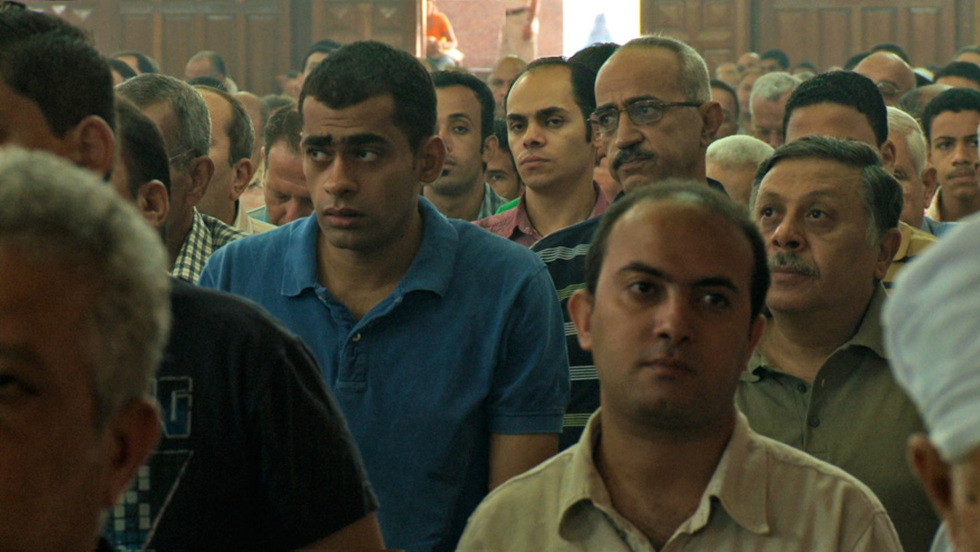
BY ALEXA SCHOENFELD |
"You Really Had Us at Hello"
Tribeca Talks: After The Movie goes behind The Virigin, the Copts and Me: the "charming and intelligent" story of a French-Egyptian filmmaker's look at family and a curious religious phenomenon

Charming, funny, and endearing are not words stereotypically associated with films about conflicts in the Middle East, but as the TFF premiere screening confirmed, Namir Abdel Messeeh’s THE VIRGIN, THE COPTS AND ME is no ordinary Middle Eastern film. Instead, Messeeh’s “masterpiece” is a “smart, simple, fantastic story about a small conflict” and a hysterical family. The film had Tribeca audiences over the moon and raving about Messeeh’s new film—accolades they were insistent on sharing at the Tribeca Talks: After the Movie panel on Wednesday, April 25.

Following the film, the French-Egyptian Messeeh, accompanied by a translator, took the stage alongside journalist Rula Jebreal, filmmaker and entertainment lawyer Andrew Lund, filmmaker Sameh Zoabi, and the evening’s moderator, film critic Glenn Kenny. Kenny kicked off the discussion inquiring about the impetus for the film, which Messeeh described as the combination of wanting “something very simple, and to film my family,” and “finding [a situation] to put them in” because a film “just about my family in life and normal things doesn’t have a story or plot.” However, it didn’t take long for both the panelists and audience members to begin doling out praises. They couldn’t help it; it “touched and charmed” them very deeply.
Ms. Jebreal was first to chime in, commending the humor in the film. Reflecting on her childhood in Jerusalem, which was “flooded with Egyptian movies and TV, “nothing was as funny as this,” she happily exclaimed. The respected journalist continued by calling attention to the novelty of the film “in this culture where you don’t make fun of religion. As the Arab world democratizes,” Jebreal continued, “it helps to make fun of religious and political figures.” Passionately substantiating her point, Jebreal expressed how she was “so thankful to this director, this movie, and to the Arab Spring because they’ve changed the perspective in America of who we [Middle Easterners] are.”
Throughout the night, every single comment or question with remarkable admiration and effervescence for the film. Mr. Zoabi voiced his immense “respect as a filmmaker that Namir wants to do justice to his people” with this work that he “so appreciated.” As a Palestinian filmmaker, Zoabi felt a certain kinship with Messeeh, specifically mentioning his challenge “of explaining the reality of being from Israel and not Jewish” in his stories about where he grew up. Zoabi also commended Messeeh’s deft way of managing the “fear to present where you come from in your work, which you did in a very beautiful way.”

Mr. Lund echoed these tributes, affectionately telling Messeeh that he “really had us at hello,” from the beginning of the film, which opens with a series of family photos as Messeeh—in a voiceover—introduces his family. “After this point, we’re invested in your story.” Lund “admired how smart” Messeeh was “about his narrative techniques and bringing us into [his] world,” and how he “fused different techniques to make the story very true.”
Before the conversation turned towards the audience, the panelists were sure to laud “the true star of the film”: Messeeh’s mother. With a lovable combination of a sharp tongue and staunch, maternal support, Messeh’s mother is an integral character in the film, which investigates the phenomenon of miraculous Virgin Mary apparitions in Egypt's Coptic Christian community. As Jebreal happily exclaimed about Messeeh’s toughest critic and biggest advocate, “She’s such a strong woman and she steals the show. She could run for United States Vice President better than Sarah Palin,” a comment which left the audience in stitches.
Kenny then asked if Messeeh’s mother had finally voiced some respect for the film—of which she is consistently skeptical, despite actively helping in the filming process (as we see on screen). Messeeh smiled and shared that his mother had just recently seen the film for the first time at the premiere screening in Qatar. “Showing my mom the film with an audience,” Messeeh added, “was the best solution to protect myself.” After viewing the film and meeting his mother, you understand this tactful choice.

When Mr. Kenny opened up an audience Q&A, the discussion turned into a phenomenally multicultural affair. With audience members engaging the filmmaker in (both) his native Arabic and French, the universal impact of the film was palpable. After an Egyptian journalist asked—in Arabic and then English—about Messeeh’s choice to raise the issue of the Egyptian conflict between Christians and Muslims, the filmmaker thoughtfully responded that his “main work as a filmmaker is to bring a way to open dialogue,” which is what he hopes to do with this film. Ms. Jebreal was also quick to interject that she thought Messeeh “was very delicate and subtle about showing the religious reality of Egypt.”
The most touching moment of the evening however was, bar none, when a young man—who spoke in French and then English—tearfully voiced his appreciation for the film. The young man noted how the film did not “fall into the trap of showing these people as victims,” instead portraying this family with “respect and dignity.” Calling the film “a jewel,” the young man continued by sharing that he “cried for two thirds of he film. It reminded me so much of my family.”